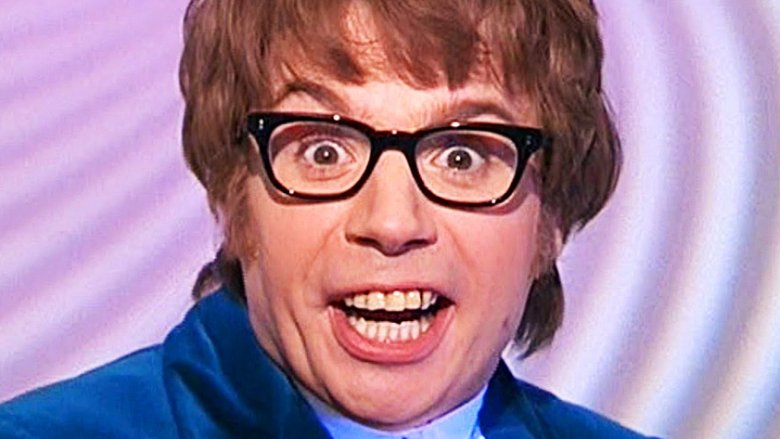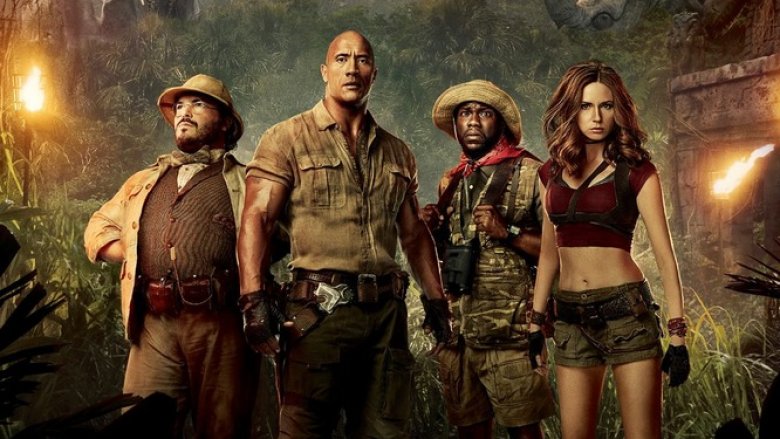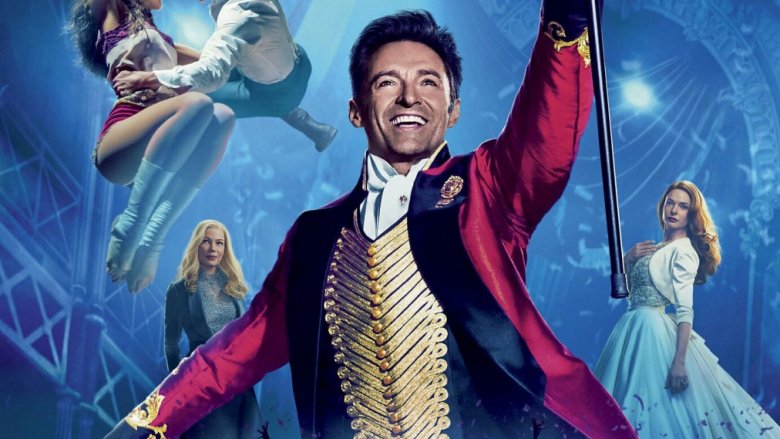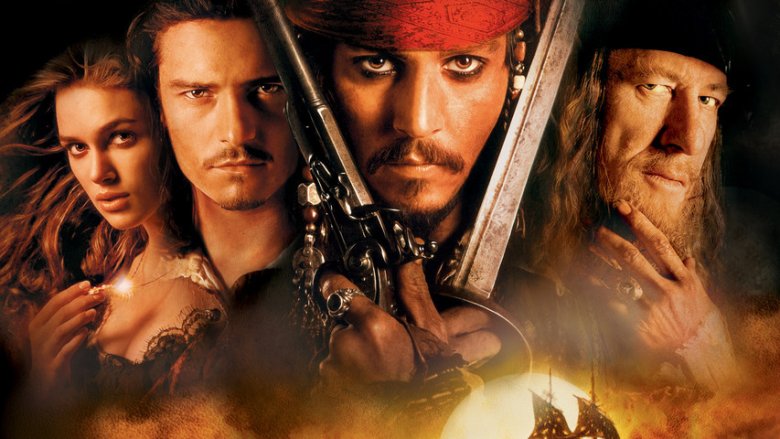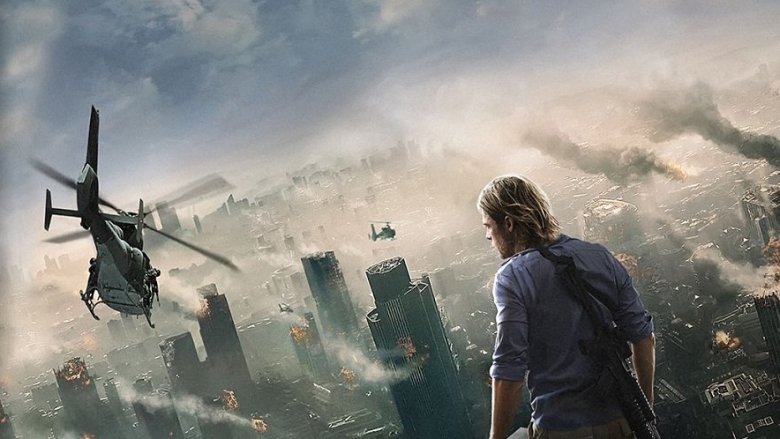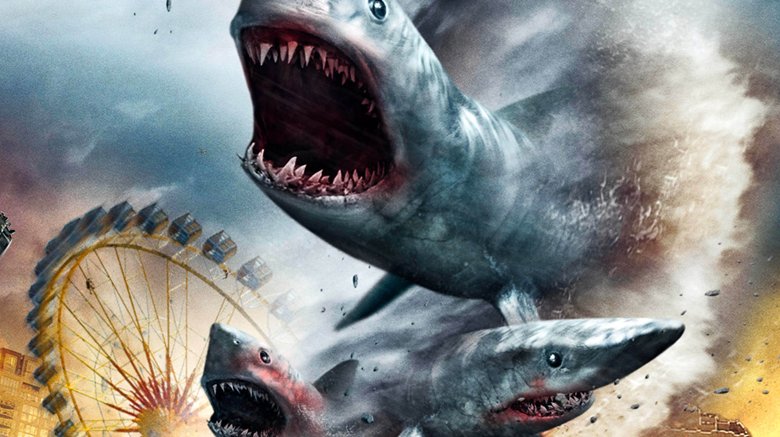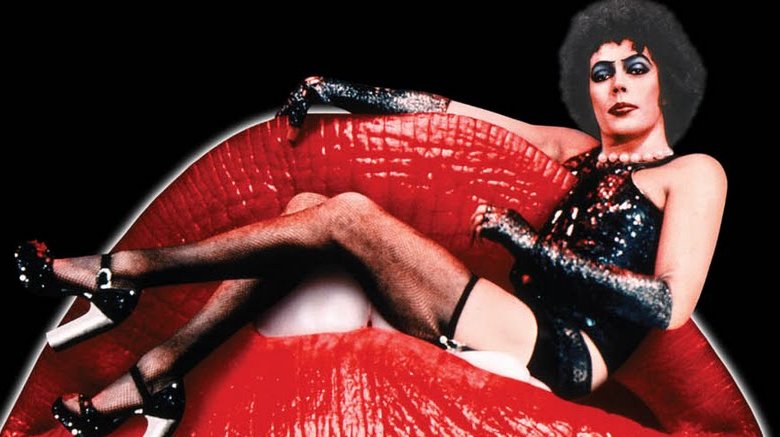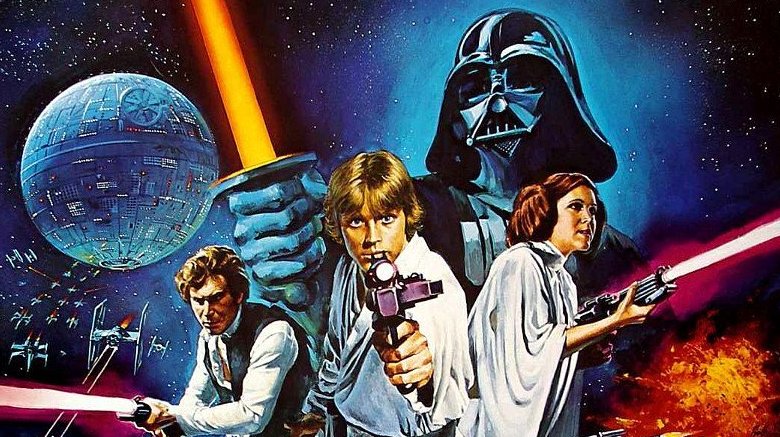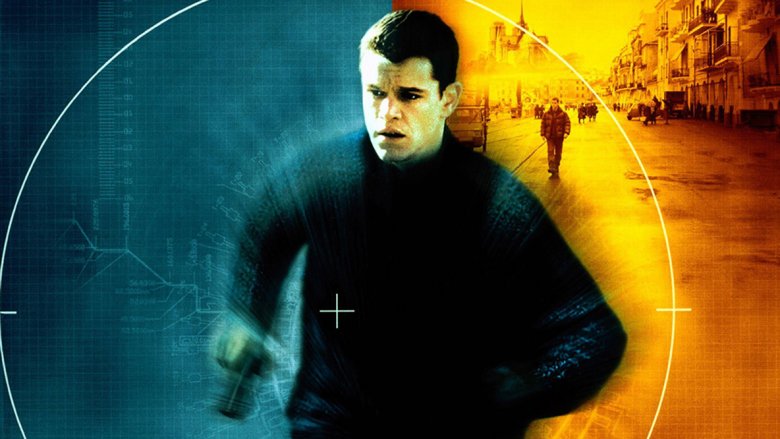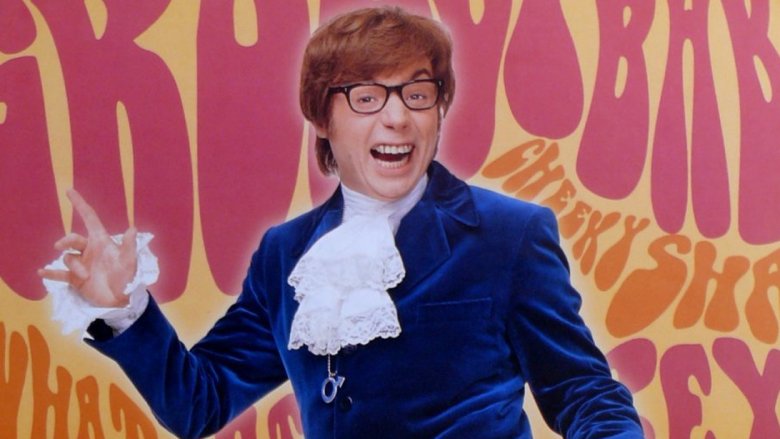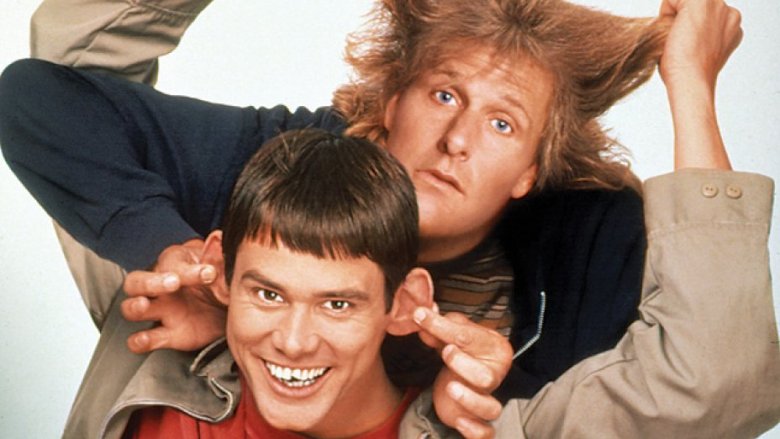Hit Movies That Were Supposed To Destroy Actors' Careers
They say in show business that you're only as good as your last big hit. While real life's not that simple, there's a lot of wisdom to that sentiment, especially for highly visible actors who live and work in the public eye. One bad movie can make a good career look like a sinking ship, and it's not always easy to see the iceberg coming. Actors choose projects for a variety of reasons, but every one is a gamble — and sometimes they bet wrong.
On the other hand, for every sure thing that crashes and burns, there's a movie that goes through its entire production looking like a disaster before miraculously sticking the landing, posting big numbers at the box office after being all but written off. Some of the most popular movies in recent years spent their development looking like trainwrecks in the making, only for all that bad buzz to be washed away by audience acceptance. You might be surprised at how many popular movies you love got off to a very bad start. Here are the hits that were supposed to sink careers.
Jumanji: Welcome to the Jungle
In the leadup to the release of Sony's belated Jumanji sequel, all the internet could say was "why, why, why." It's not unjustified — somewhere in between Grown Ups and Ghostbusters, Sony sort of lost the benefit of the doubt from audiences, and thanks to the behind-the-scenes revelations of the embarrassing Sony hack, there was a widespread perception of the studio as being flailing, out of touch, and desperately thirsty for a hit.
A sequel to Jumanji struck many as being Sony digging for gold in all the wrong places, changing the original's board game conceit to make a hybrid body-swap comedy and video game movie. It sounded terrible. But Jumanji: Welcome to the Jungle came out of the gate strong, holding its own against Star Wars: The Last Jedi and staying in theaters for weeks, eventually bringing in nearly a billion dollars at the global box office.
Nobody saw it coming, but the sequel was able to win audiences over thanks to a combination of charismatic performances, clever writing, and a family-friendly tone. Many people got dragged to see this over the holidays, and despite their initial misgivings, most of them more or less liked it, making another sequel a sure thing.
The Greatest Showman
Critics kicked The Greatest Showman down the stairs when it turned up on the release calendar, but amusingly, audiences didn't listen. Thoroughly unmoved by the historically inaccurate and sappy musical, professional reviewers sent this Hugh Jackman vehicle off with a kiss and a wave, expecting it to be in and out of theaters with a quickness.
Though it looked like it was destined for failure upon release, that's not what ended up happening. Surprising industry analysts, The Greatest Showman rode a wave of word of mouth and built an audience slowly, bringing in over $420 million dollars at the global box office. But in its first weekend of release, the musical made only a minuscule $8.8 million.
That's not usually the way things work. Typically, a movie lives and dies by its first weekend, but The Greatest Showman is one of the surprise successes that shows conventional wisdom isn't necessarily gospel. Despite never notching the number one spot at the box office, the movie's longevity made it into a huge hit, surprising analysts and setting a record as the highest-grossing original live-action musical ever.
Pirates of the Caribbean: The Curse of the Black Pearl
Movie studios love their intellectual property. Original ideas are risky, the thinking goes; only things that people have heard of are worth being made into a movie, even if those movie ideas sound painfully, horribly dumb.
When it was originally announced, Pirates of the Caribbean: The Curse of the Black Pearl elicited eye rolls and heavy sighs. Who would want to watch a movie about a theme park ride? As we all know by now, the answer is well over a billion dollars' worth of people.
Even after the success of Pirates of the Caribbean, a movie based on a theme park ride still sounds like a wretched idea. The Curse of the Black Pearl and its several sequels stand up as exceptions that prove the rule, with subsequent adaptations of Disney attractions failing to capture anywhere near the same level of success. Since the release of the first Pirates, there's been The Haunted Mansion starring Eddie Murphy, Tomorrowland starring George Clooney, and The Country Bears, starring a limitless fountain of human misery. None of these have been nearly as successful as that first seafaring surprise hit, and even the Pirates sequels have gotten pretty shaggy as the series has dragged on. But that first movie is something magical, and it really shouldn't have worked.
World War Z
World War Z had a lot going against it in the months leading up to its release. From the fan side, readers of the Max Brooks book on which the movie is based were furious and disappointed to hear that the story was being completely changed from its source material. Meanwhile, from the business perspective, the production was a complete disaster, plagued with expensive reshoots, an exploding budget, and a lack of direction.
The problems were myriad and comical. Collaborators openly criticized each other in the press, pointing fingers to dodge blame for the overbudget production. Weapons for a climactic battle scene in the Russian wilderness were seized by counter-terrorism authorities in a highly publicized raid. Brad Pitt admitted that more was changed in the adaptation than he intended, saying before the movie was even released that "it didn't turn out the way we wanted it to."
The forecast for the movie was more apocalyptic than its plot, with analysts predicting the zombie movie would fail to earn the $400 million it would need to turn a profit. But instead of bombing, the movie rallied on the final lap to bring home a global box office of $540 million, setting a personal record for Pitt while turning a tidy profit despite the doomsaying. It was an anticlimactic end to a classic Hollywood train wreck story — but we still bet the stress of the production took years off peoples' lives.
Sharknado
On the list of hits that should have been disasters, Sharknado is a curious exception. It was never supposed to sink the careers of those involved — rather, the low-budget Syfy original movie with the hokey premise, bargain bin CGI, and a cast of C and D-listers was more designed to keep careers afloat.
The success of Sharknado was both unexpected and inexplicable. Imagine if a creaky lifeboat suddenly shot out of the ocean like a rocket at 700 mph to circumnavigate the globe — that's sort of what Sharknado is, and if the metaphor doesn't make a whole lot of sense to you, well, that's fitting enough.
While many movie successes are the result of careful and clever marketing campaigns, no one really knows why Sharknado stood out from the B-movie pack to become a social media sensation. "Everybody asks, you know, why did this happen?" director Anthony Ferrante said after the movie secured its spot in B-movie infamy. "You can't ask why; it's Sharknado. It's a movie about sharks and a tornado, and it just hit everybody's sweet spot for whatever reason this summer."
And the concept kept bringing the audience back. The original movie premiered on Syfy to 1.37 million viewers, but brought in more than double that for its sequel, eventually spawning six mainline entries and its own spinoff "documentary," Sharknado: Heart of Sharkness.
The Rocky Horror Picture Show
We weren't supposed to know about The Rocky Horror Picture Show. The bawdy musical horror-comedy, released in 1975, was a poorly reviewed, underattended flop on its release, written off by its distributor as a loss in the months that followed its rollout.
While the movie received an encouraging reception on its initial release in a single Los Angeles theater, the campy adaptation of a stage musical floundered when it expanded to other markets, performing so lousily that 20th Century Fox decided to cancel the movie's national release.
But there was something curious going on with that one Los Angeles theater, which kept hosting screenings of the movie that continued to do good business. The expanded theatrical release had showed that the movie wasn't for everybody, but the people that liked it seemed to really like it.
Sensing something in the air, Fox executive Tim Deegan decided to try and stoke the movie's cult appeal, arranging for a midnight run in New York City's Waverly Theater beginning on April Fools' Day 1976, with the aim of drawing out the weirdos and misfits that the movie appealed to most.
It was a strategy that paid off. The freaks and geeks that saw the picture spread its gospel, establishing audience participation rituals that endure to this day. Instead of being a weird specimen in the filmographies of its cast, The Rocky Horror Picture Show was a hit with legs, still playing in theaters around the world decades later.
Star Wars
Now that Star Wars has secured its place as a permanent and perennial capital-T Thing that will never, ever die, it's somewhat weird to consider that there was a time when it really didn't look like it was going anywhere.
According to series creator George Lucas, nobody involved with the production had any real faith that the movie was going to be anything but a small-scale disaster. Rather than finding their lack of faith disturbing, Lucas more or less agreed.
"I didn't think the film was going to be successful," Lucas said, speaking at a Tribeca Film Festival panel in 2015. "I showed it to all of my friends early on, but it was mostly [filled with] stock footage of old war movies, and all kinds of stuff. They saw it and [said] 'Poor George. What were you thinking?'"
Forget turning a profit — sci-fi movies at the time were barely breaking even, a worrisome trend to consider as Star Wars' budget ballooned from $3.5 million to $10 million. Early assembly cuts were borderline nonsensical; from the way Lucas puts it, the only person who had confidence that the movie would be a huge hit was Steven Spielberg, who proclaimed after one early screening that Star Wars was going to be "the biggest movie of all time."
According to Lucas, "Everybody in the room looked up at Steven and [said], 'Poor Steven.'"
The Bourne Identity
The leadup to the release of The Bourne Identity had people involved with its production bracing for impact. After a contentious screenwriting process that at one point saw Matt Damon ready to walk away from the movie, principal photography itself proved even more difficult.
The production went over budget and over time, with some of the creative collaborators openly taking shots at director Doug Liman in the press for his perceived indecisiveness, slow creative process, and other indulgences. (One story that was circulated involved Liman paying the crew overtime to string up lights in a forest so he could play paintball, a classic anecdote in the category of "man, what are you doing?") Relationships were ruined, everyone was mad, and writer Tony Gilroy at one point sought to share credit on the script with somebody, anybody, in an effort to dilute the blame.
In the end, the struggles ended up being worth it. The Bourne Identity hit theaters in June 2002, nine months after its originally scheduled release date, and it went on to be a sleeper hit through good reviews and positive word of mouth. Instead of sinking careers, the movie instead sparked a franchise, keeping everyone in work for years to come — except for Liman, who was not asked to return.
Austin Powers: International Man of Mystery
Spoof movies are a dime a dozen genre, and the Austin Powers series is a big exception. Grossing upwards of a half a billion dollars over the course of three entries, the series has endured in pop culture for so long that it's almost become spoof-worthy itself.
The outlook wasn't always so solid. Austin Powers: International Man of Mystery had a smooth production, sticking to both its budget and its schedule. But when it came time to screen the movie for audiences in the lead up to its release, it appeared the movie was missing the mark in a major way.
"The test screenings were not good," Michael De Luca, New Line Cinema's then-president of production, later said during a retrospective. "But it was a curveball movie that wasn't really built for test screenings."
According to De Luca, comedy features at the time "were sitcom-y and the same thing over and over again," and the movie's curveball nature made it a big strike out at test screenings. "Studios come down on you if you score a 70 in a test screening," director Jay Roach later said. "We never got above a 55."
Fortunately, the important people at the studio like De Luca actually believed in the movie, and spent mucho marketing money to juice up the movie's chances at the box office. A modest hit in theaters, the movie became a sensation on home video, and a franchise was born.
Dumb and Dumber
Comedy doesn't get much purer than Dumb and Dumber. The 1994 road comedy starring Jeff Daniels and Jim Carrey won over audiences with its devotion to dumbness, but on paper, the movie just looked like a stupid idea — especially to Jeff Daniels' reps.
According to The Huffington Post, Daniels' agents strongly advised the performer against taking the part of Harry Dunne in the lowbrow comedy, steering clear for the sake of his professional reputation. At the time, Daniels was almost 15 years into his acting career, building himself a résumé of serious roles in dramas and romances. Instead of sinking his career, the hit comedy instead ended up showcasing Daniels' versatility, and to this day is a beloved jewel in his filmography.
Today, no one really talks about Daniels' turn in forgettable fare like Love Hurts or There Goes the Neighborhood, but Dumb and Dumber made a huge impression. So what if that incredible toilet scene is probably going to end up carved into Daniels' gravestone? There are plenty of actors out there who'd kill to leave behind a legacy of such comical, ridiculous, completely unapologetic joy.
